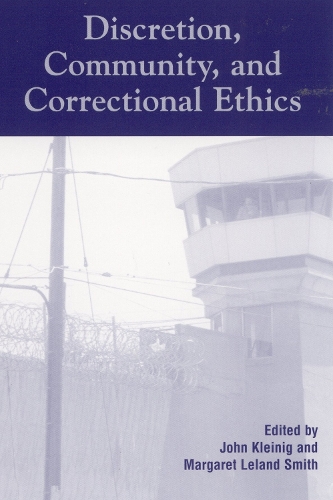
Discretion, Community, and Correctional Ethics
(Paperback)
Publishing Details
Discretion, Community, and Correctional Ethics
By (Author) John Kleinig
Edited by Margaret Leland Smith
Contributions by Heather Barr
Contributions by Audrey J. Bomse
Contributions by Derek R. Brookes
Contributions by Todd R. Clear
Contributions by William C. Heffernan
Contributions by Zelma Weston Henriques
Contributions by Michael Jacobson
Contributions by Kenneth Kipnis
Bloomsbury Publishing PLC
Rowman & Littlefield Publishers
28th August 2001
United States
Classifications
Tertiary Education
Non Fiction
Penology and punishment
174.9365
Physical Properties
Paperback
272
Width 154mm, Height 230mm, Spine 19mm
411g
Description
Some two million Americans are in jail or in prison. Except for the occasional exposZ, what happens to them is hidden from the rest of us. Is it possible to develop and instill a professional ethic for prison personnel that, in partnership with formal regulatory constraints, will mediate relations among officers, staff, and inmates, or are the failures of imprisonment as an ethically-constrained institution so deeply etched into its structure that no professional ethic is possible The contributors to this volume struggle with this central question and its broader and narrower ramifications. Some argue that despite the problems facing the practice of incarceration as punishment, a professional ethic for prison officers and staff can be constructed and implemented. Others, however, despair of imprisonment and even punishment, and reach instead for alternative ways of healing the personal and communal breaches constituted by crime. The result is a provocative contribution to practical and professional ethics.
Reviews
In this book, John Kleinig and Margaret Leland Smith, two well-known and insightful thinkers in the criminal justice ethics field, offer readers an exciting look at cutting-edge issues in correctional ethics. Contributions to this edited volume are first-rate and highlight the moral dilemmas faced by society, correctional personnel at all levels, and by those who are sentenced under American criminal law today. This excellent book misses nothing; with topics ranging from a discussion of whether a workable correctional ethics is even possible, to a consideration of moral issues involving gender and race. -- Frank Schmalleger, Ph.D., The University of North Carolina at Pembroke
Discretion, Community, and Correctional Ethics has a refreshingly large sense of the terrain of correctional ethicssomething all too frequently absent from texts on professional ethics. Questions and qualms about the moral justification of incarceration and about the very possibility of 'correctional ethics' are raised from the start and provide the continuing backdrop against which specific issueshealth care behind bars, sexual exploitation of female prisoners, staff-management relations, and othersare discussed in intelligent and illuminating ways. Among the authors are correctional practitioners and academics from a wide variety of disciplines. In my view, this is how professional ethics ought to be addressed. -- Jeffrey Reiman, American University; coauthor of The Rich Get Richer and the Poor Get Prison
Both collectively and singularly, the voices heard in this volume remind us that correctional practice cannot be reduced, as it often is these days, to antiseptic considerations of efficiency and effectiveness. The authors illuminate that the core challenge of the correctional enterprise is to act ethicallyto maintain an abiding respect for humanity in the face of daunting day-to-day circumstances. Readers will be appropriately provoked to question their easy acceptance of current correctional practices and moved to envision how an evolving correctional ethic might guide us toward a new penology that is uplifting to both keepers and the kept. -- Frank Cullen, University of Cincinnati
Author Bio
John Kleinig is professor of philosophy, and director of the Institute for Criminal Justice Ethics, at Jon Jay College of Criminal Justice, CUNY. Margaret Leland Smith is adjunct professor, and senior researcher at the Institute for Criminal Justice Ethics, at John Jay College of Criminal Justice, CUNY.
